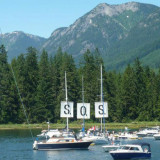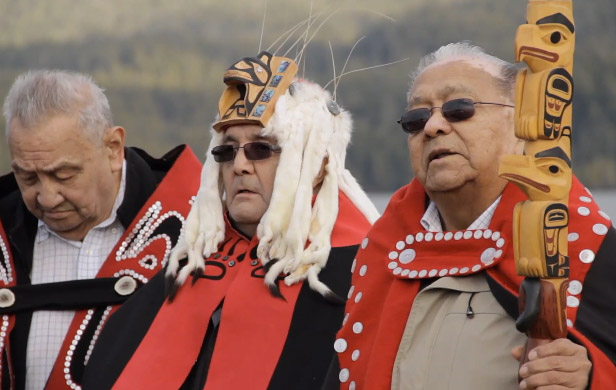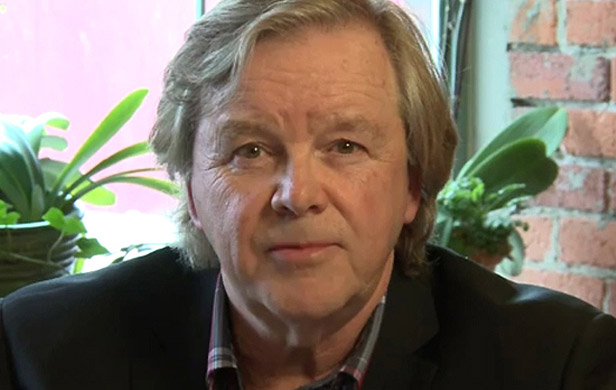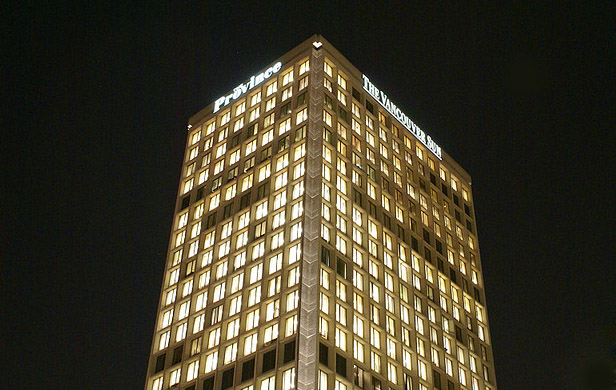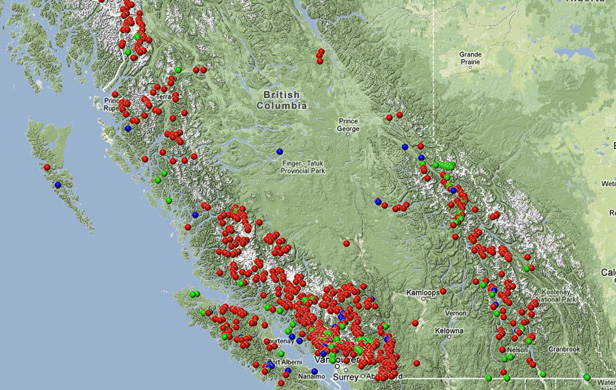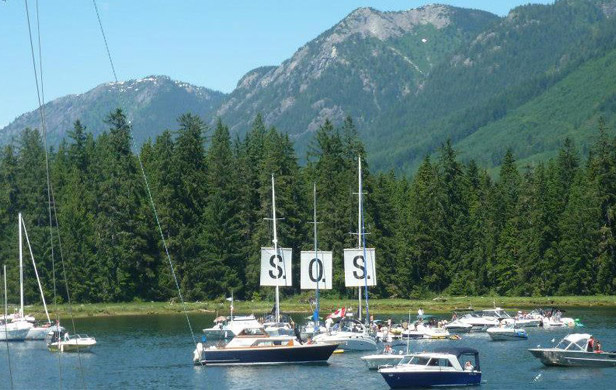
Howe Sound is Canada’s southernmost fjord. It is a natural beauty which should be declared a world-class heritage site.
I grew up as a child on Howe Sound and well remember the men with the herring rakes, raking out the herring for salmon bait. Speaking of the salmon, if you went fishing and didn’t catch one, you must’ve forgotten to put a spoon on your line.
Over the years, Howe Sound went downhill. Industry polluted and people became careless about the environment. The fish disappeared; the whales disappeared; the Orcas disappeared; the herring and salmon seriously diminished.
Howe Sound on rebound…
A revitalization program – partly official, mostly just people taking care – has brought Howe Sound back, not quite to where it was when I was a boy, but considerably back to where it should be. Herring came back, salmon increased, Orcas abound and humpback whales have appeared for the first time in years. The fishing industry has restarted.
…But not for long
This, unfortunately, was not to last. Industry has reappeared, big-time.
Just let me give you an example of what we now see on the horizon for Howe Sound:
1. $60 million proposed McNab Greek creek gravel mine
2. $1.7 billion Woodfibre liquefied natural gas (LNG) project
3. $350 million Eagle Mountain Woodfibre gas pipeline expansion project
4. $500 million Metro Vancouver waste incineration facility at Port Mellon
5. We already have three private, ‘run-of-river’ projects, one approved and two in the process of approval – under the radar somehow.
6. A multimillion dollar real estate development at Brittania Beach involving 4000 homes. God knows how many cars and of course all of the impact such large, new community will bring.
There are a number of citizen groups opposed to this development, both in Squamish and other parts of the Sea to Sky Highway and Howe Sound communities.
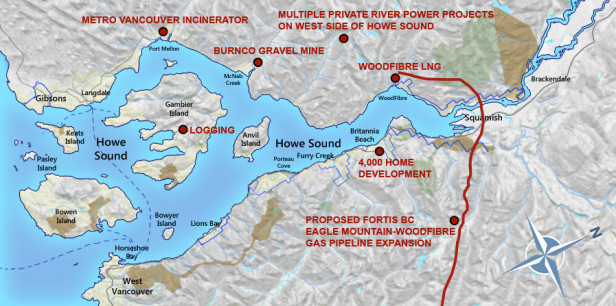
Gravel pit threatens salmon, recreation
McNab Creek gravel pit is the center of attention. A gravel pit, for God’s sake! McNab Creek, apart from the Squamish River, is the only salmon-bearing river in Howe Sound. The gravel pit will, of course, have all of the usual effects on salmon rivers that gravel pits do. Erosion, siltation, and habitat loss will threaten multiple species of spawning wild salmon.
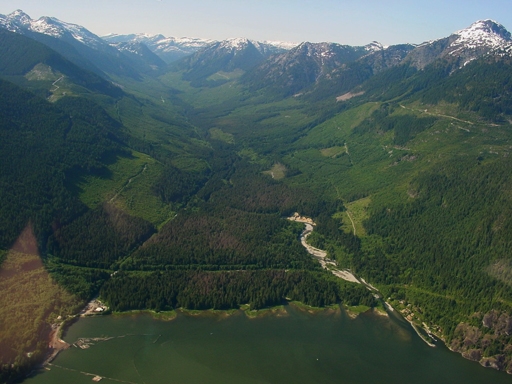
The company, Burnco, out of Calgary, wishes to use McNab Creek because it is closer to its customers and cheaper to deliver gravel by boat. This will be a catastrophe and it’s safe to say that the people of the Howe Sound area are almost entirely opposed to it.
This massive assault cannot be under played. We will have lost a world class beauty spot. I haven’t even mentioned the impact of tankers out of Vancouver.
The difficulty comes in the opposition. People are law-and-order by nature and tradition. They don’t like to offend the law but obey it. John Weston, a conservative MP for the area, is fond of talking about how there is “process” in place.
Environmental review process deeply flawed
Well, folks, this “process” is about as fair as the Soviet show trials were in the 1930s. The fix is in. The process doesn’t involve the people expressing their opinion as to whether not they want the project – all they can do is offer suggestions as to how the environmental process might proceed.
The meetings are stacked – the proceedings biased and there’s always somebody from the company on the stage to “explain things”.
Companies are ordered to perform routine processes such as have public houses and opportunities where they try to explain themselves to the public. The difficulty here is the companies are not noted for telling the truth anymore than governments are. There’s no frank discussion of the downside of the project – simply a propaganda exercise complete with pretty pictures and models showing what a marvellous thing this is going to be for the people. In the case of Burnco, they fail to mention that it will entail just 16 low paid jobs.
Time for civil disobedience
There is nothing harmless about a gravel pit on a fish bearing river indeed on any river.
Unfortunately the answer to the question – if indeed there is an answer – involves civil disobedience.
One is always reluctant to suggest this for fear of being seen as promoting violence, which I’m not. I am not fomenting revolution; I am simply saying that unless the citizens of the Howe Sound area – indeed all of British Columbia – stand up to the government and refuse to accept these projects, they will go ahead.
Refusal to accept means, frankly, getting in the way of the production. Lying down in front of bulldozers and that sort of thing.
The pattern that follows is all-too familiar. The company takes the civil law and turns it into criminal law by getting injunctions against a few of the people who protest – and when those people refuse to obey the injunctions, they are sent to jail for contempt of court and that takes the steam out of the movement.
It’s that latter phrase we must watch – taking the steam out of the movement. We must have enough people prepared to go to jail that it is the government and companies who tire of the exercise, not the public.
This takes organization and it takes people willing to make sacrifices. This means that more and more people go to jail so that the authorities tire and, in fact, perhaps even run out of jail space.
Democracy in name only
In a democracy these are strange words. The problem is is we should know we live in a democracy in name only. The public does not get the right to decide what’s going to happen to them – that’s decided by line corporations with their handmaidens in government.
Am I being too hard on governments and corporations?
I don’t think so – all you have to do is look at the amount of money spent by the public relations people in industry has been almost duplicated by governments using public funds – so a docile public hasn’t got a chance.
When you add to that a media that is beholden to government and industry, the public has almost no chance of being informed, except by volunteer efforts without the backup of expert opinion.
It is gone on long enough.
Time to get together
Pipelines will abound in British Columbia to make money for somebody else and destroy our heritage. We, the people, are offered nothing else but go through the process and then sit back and take it.
Surely that’s not good enough.
Surely we must finally get together and fight back.
We have valuable allies in first Nations. Unfortunately they have the right to think that they’re standing alone on this fight and everybody else is waiting for them to win it. This is simply not fair nor is a practical. We have to get behind that leadership and support it every way we can, personally and monetarily.
If we do not rise up as one and fight back against the power of hugely-funded industry and client governments, we will lose our province.
The solution is strong medicine. It will be difficult to organize. But we’ve got to do it.
********
P.S. Rafe’s back
I have been away – I hope you noticed. It started in the middle of December when I took a bad fall and went to hospital this was aggravated by another fall after I got home in January. To make a long story short, I spent 4 ½ months in the hospital and nearly bought it three times. Presently I am home and still quite weak. It will take some time for me to get better, I am told.
In the meantime I hope to get back to doing more writing. This is my first story for The Common Sense Canadian in nearly 6 months. I hope to vastly improve upon that record.
In the meantime I thank you very much for your patience and I am delighted to see that my friend and colleague Damien Gillis has kept things running and the magazine has grown and prospered.
Sincerely,
Rafe Mair
